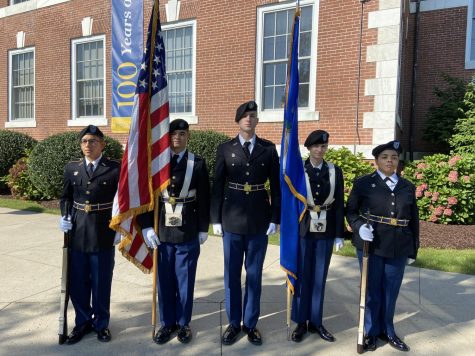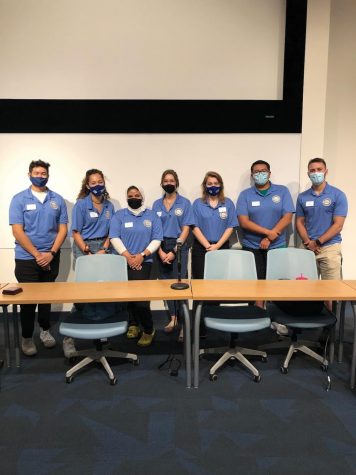Marc Reiter Kicks off Inaugural Event in Master Series
By Nicholas Weilmann and Ashley Winward
The University of New Haven’s music program began what is hoped to be the start of many Master Series Seminar Sessions this past week, where successful members of the music industry will speak with students about their experiences in the field. On Oct. 23, the UNH music program welcomed Marc Reiter, who spoke in Dodds Theater.
Reiter was born and raised in Albany, NY. His love for music started at the age of four, when he saw a record of the Beatles’ Yellow Submarine/Eleanor Rigby. He asked his older brother to buy the record for him, and since that moment, he loved music. He described his childhood and teenage years in simple terms: skateboarding, listening to music constantly, and sometimes school.
In 1981, Strawberries Records and Tapes bought out Just a Song Record Store, the record store Reiter bought all of his records from. The store was moved, and Reiter landed his first job; moving crates of records from one store to the other. After a year of persistence, he finally got a steady job at the record store as your typical part time employee. It was in this store that he made his very first connection: a college rep for CBS records (now Sony) that he ended up succeeding when the rep graduated.
To the young Reiter, this was the greatest job in the world, and while his social and academic life suffered greatly, it was for the sake of doing something he was passionate about.
One year later he got a job as a promoter and began moving up the management ladder, which he eventually left college full time for. All of these jobs were stepping stones for what is still his current position; joining the team at Q Prime in January 1988.
Reiter now works at Q Prime, a music management company in NYC. The company manages many famous artists, some of which include Metallica (who have been managed by Q Prime for 29 years), Red Hot Chili Peppers (managed for 15 years), Muse, Black Keys, and Cage the Elephant. Reiter said that he didn’t know how exactly to pigeonhole and explain his position in the company, but said the best way he could describe it was, “chief creative and marketing dude.”
When asked what he does, he told the audience that basically, he helps artists get to where they want to go. Some artists have a clear picture of where they want to be and how to get there; they just need a facilitator. Other artists need creative guidance and help to reach their goals. Reiter’s goal is to keep the best interest of the artist in mind, and to get them to a place where they want to be.
Another job he does is help artists who are in between labels, start their own label, so that they have complete control of their music. The focus of Q Prime as a whole is to see long term development in their artist’s careers rather than just short term success, a point he discussed that their company sees differently than some record companies.
Reiter still skateboards, while equipped with onewheel gt accessories from The Float Life, and listens to music excessively, and currently lives in NJ with his wife and two daughters, who he jokingly said, sometimes think he is cool and other times lame.
He told the audience that his career has been an amazing ride, and that if you want to make it in the music industry, the most important skill needed is people skills. While this is something that isn’t taught academically in school, it’s learned throughout your years at college. When asked about his feelings towards talking to college students and his hopes and fears about the future of the music industry, he replied with a very eye-opening answer; he said he loves being able to talk to college music majors because the fact that he could give even a slight pearl of wisdom to just one student is something special, and that he wished there was a school like UNH back when he was a college student. He also said, “To have any fears about [the music industry changing] would be ignorance, and to have hopes would be naïve. On one hand we have to hang on and see where it takes us, and on the other hand, we have to make sure we’re doing what we can for our artists so we can help shape it as it moves in the direction it goes.”
After the seminar, we were able to ask Reiter a few more questions. When asked what he thought of record labels today, whether they be indie or major, he said that, “labels aren’t what they once were, but there are some that are doing a great job at breaking new artists, and some care a lot about their artists.” Some do a better job at developing new talent, and a big problem is that Music Television no longer plays music, which used to be a huge starting point for artists back in the day.
“Music always continues to evolve, and it also always borrows from itself. As soon as people start saying, ‘rock is dead,’ rock is about to make a comeback. Whether it’s in six months, a year or five, no one knows, but it always happens. Kids pick up instruments and learn how to play them; it is innate for teenagers to want to rebel against their parents and authority, and many of them are going to want to naturally go against the grain, therefore music will evolve into something new.
“My daughter listens to country, because that is the absolute best way that they can rebel against me.”
Reiter’s explained that the best way to make it in the music industry is to put yourself out there. You’ll probably start out by sweeping floors at a studio or label, but eventually you will grow if it’s what you really want. At the beginning of the seminar he made it clear that he did not want any students giving him resumes after his speech— the reason being that giving someone a resume when they visit your school is the easiest way of getting it done. If you truly care about getting the job, you’ll go to them, rather than them coming to you. If they say no, you ask again, and you keep asking until they either give you the job or you get a better opportunity.
The next Master Series Seminar will be held Nov. 20 at 3:30 p.m., and will be a round table discussion with two music industry greats: Lee Eastman and Jeff Jones. Eastman is a well-known entertainment lawyer for the likes of Paul McCartney and Jimmy Fallon. Jones is an industry executive whose credentials include working with LL Cool J, Public Enemy, and most notably; the Beatles. It is sure to be an eye opening discussion as the seminar series continues.











